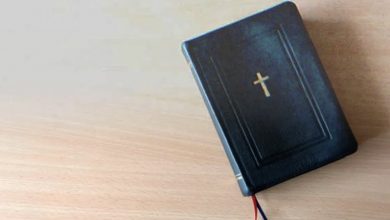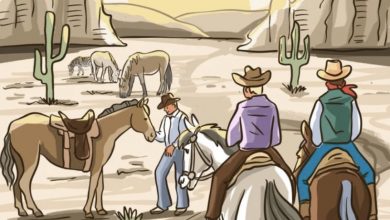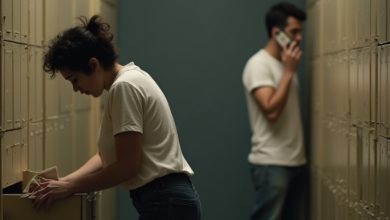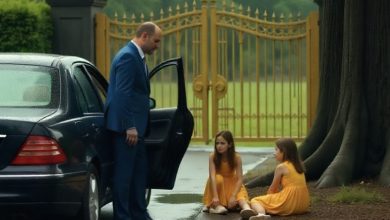After Returning From Service, a Father Discovered His Daughter Sleeping in a Pigsty — What He Did Next Shocked Everyone
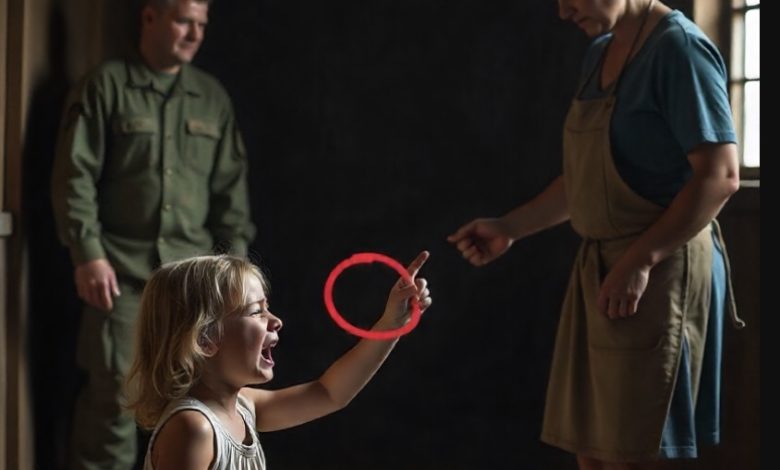
The man had barely stepped through the gate when he heard a child crying behind the house, from the direction of the old pigsty. What he saw froze him in place. Even a soldier used to hard things would have stopped. But what changed everything in the village wasn’t the scene itself. It was the way he chose to act next.
People can travel far, cross deserts and mountains, but sometimes the longest distance between two people is a letter that never reached the one who needed it.
On the bus going south, Tomás Herrera sat by the window without moving. His hands stayed where he’d put them at the terminal. Between his knees he kept a clean but dusty backpack. In one hand he held a stack of old letters. The blue ink had faded into a light blur, like chalk on a board left in the rain. He had read the top letter three times since leaving the barracks. Each time, the last lines dried his throat.
“Dad, I didn’t eat breakfast. Mama Miriam said there were no eggs, but I saw the egg lady pass by. I didn’t say anything, because if I ask, they leave me outside. When you come, knock on the back door. The front is locked.”
The writing slanted to the left. It shook a little. It looked like the hand of a small child who was trying hard not to make a mistake. Alma had pressed the pen so much the paper had thin spots. She wrote like she feared the letter would be torn up or not read at all.
Tomás turned to the next envelope. Many letters had been opened and closed more than once. The edges were bent. One page had water spots. It hadn’t rained inside that envelope; he knew that. The driver, a thin man with gray hair and a lined face, broke the silence, eyes still on the road.
“You’re a soldier.”
Tomás looked up. “The backpack gave me away?”
The driver nodded. “You look like you just got back.”
“Four years,” Tomás said.
They rode in silence. The bus shook on the rocky road flanked by cactus rows. As they neared a dirt turnoff toward the ranches, the driver spoke again, quiet, like he wasn’t sure he should.
“Maybe you’ve heard… They say a little girl from the Herrera family was locked in a pigpen. A full week. No food. That’s what people say.”
Herrera wasn’t a common name here. Tomás kept his face steady. “What little girl?”
“Maybe it’s just town talk,” the driver said, meeting his eyes in the rearview. “People say things. Maybe she was just told to stay outside. Nothing serious.”
Tomás did not answer. He stared out the window, but he didn’t see the road anymore. All sounds faded inside him. The same words circled, again and again. He had left his daughter with Miriam the day he buried his wife. Alma was only three then. She still sucked her thumb. She couldn’t tie her laces. At the funeral, Miriam wore a simple black dress and said, “I’ll treat her like my own. A child needs a woman in the house.” He had been a soldier his whole adult life. He followed orders. He wanted to believe this was the right choice. Miriam had been a close friend of his wife. He thought she would bring stability.
He had thought wrong.
A few weeks before he came home, Dr. Felipe Andrade, an old friend of Tomás’s father, sent a package of letters. “Read these before you return,” the note said. One letter in pencil, almost rubbed out, still cut him when he read it:
“Dad, we don’t have a window now. A mouse got in my bed. I didn’t tell Mama Miriam. Last time I told her, she threw my pillows outside.”
Something in Tomás broke. Not a loud break, but a quiet one that hurt deeper. The bus pulled into an empty lot by the town’s entrance. The driver handed him his pack. Tomás thanked him and climbed down, heavy shoulders, firm steps.
The path to the house was red dust. Once, Alma had drawn chalk dolls on the walls there. He didn’t know if those walls still stood. He didn’t hurry. He picked up a small white stone and slipped it into his pocket. Sometimes a father needs no weapon—only a clear direction. “Daughter, I’m home,” he told himself.
He reached the house where he had lived with his wife. It was no longer a home, just a wooden frame that looked brand new. New windows. Fresh paint. The wedding photo that used to hang above the altar was gone. Everything that smelled of the past had been scrubbed away. It felt too clean, like someone was hiding the years on purpose. No dog barked. No quick feet ran to greet him. Only silence.
He didn’t knock. He moved down the side path to the backyard. The old gate still squealed when he pushed it. The hibiscus flowers his wife loved were gone. A few cacti stood alone near the stones. The bamboo, once tall, had been cut short.
A sound came—rough, sharp. A yell. “Get up! Clean this up! Useless!”
A slap. A choked cry.
Tomás moved faster, toward the old pigpen under a thin tarp. Another shout ripped the air.
“Without a mother, you belong with the animals. If I didn’t pity you, you’d starve.”
He pulled the tarp aside in one motion.
In the dim light, Alma lay curled on straw. Her gown was torn at the shoulder. Her heels were scraped. Dust and straw clung to her hair. Her face looked empty and afraid. In front of her stood Miriam, gripping a belt, face red and hard.
Miriam kicked the girl toward the corner. Alma hit the wood, and the boards groaned.
Tomás did not rush in. He stood still. His hands closed into fists. His nails cut into his palms. He didn’t shout. He didn’t curse. He opened the gate of the pen and stepped inside, quiet as a knife.
Alma looked up. Her eyes fixed on him. The smell of gunpowder, sweat, and mountain wind—her father’s smell—wrapped around her. She stumbled to her feet. Her legs failed, but before she fell, he had her in his arms. She pressed her face into his dusty shirt.
“Daddy. It’s really you.”
“I’m here,” he said.
Miriam turned, her face draining of color. “Tomás—when did you—? I was just scaring her. You know how stubborn she is.”
“I left my daughter with a caretaker,” he said, slow and heavy. “Not a jailer.”
Miriam dropped the belt, fumbling. “I looked after her all this time. I’m tired too. She never listens. She sits there, always quiet. I was afraid she was sick.”
“Afraid she was sick… or afraid she’d speak about what you did?” he asked.
Miriam’s mouth opened. No sound came.
Tomás walked out with Alma in his arms. Dust rose under his boots. “Where will you take her?” Miriam called. “You have no home. Nothing!”
Alma clung to his neck and whispered, “Dad, I’m not afraid of being poor. I’m only afraid of the pig smell.”
He held her tighter and went through the gate. Across the street, a curtain moved. The fish seller stared, hands still wet. Nobody spoke. The silence was not fear—it was guilt. They had all seen. They had all stayed quiet.
“Daddy… are you mad at me?” Alma asked softly.
Tomás stopped and shook his head. “No, my girl. None of this is your fault.”
A light wind brushed their faces. It smelled like nothing in particular—just clean air. And with that breeze, some of the heat inside him cooled. He still hurt, but something stronger rose in its place: the simple decision to carry his daughter out of that place with his arms and with his heart.
They went straight to the clinic on the hill. Dr. Claudia Navarro, hair streaked with gray, eyes steady, lifted Alma’s collar and checked her back. She sighed. Then she listened to Alma’s chest, gentle and thorough.
“She’s been tied up before,” the doctor said quietly.
Tomás didn’t answer. He tightened his backpack strap and closed his eyes for a second.
One by one, the doctor traced the scars—under the shoulder blade, inside the thigh. Fresh scratches. Dark and yellowing bruises. Pain that hadn’t been allowed to heal.
Alma looked up at the lamp. She didn’t show anger. She looked like she was waiting to see if trust was safe. Tomás knelt and took her small, cold hand.
“If you came back… will you stay?” she whispered.
He didn’t speak right away. That question cut deeper than any wound. He squeezed her hand. He couldn’t make long promises. He gave her a firm nod.
Dr. Claudia wrote notes and closed the file. “We should report this,” she said. “But I know what you expect from the system.”
Tomás gave the slightest shake of his head. It wasn’t that he didn’t believe in laws. He simply knew paper wasn’t enough to warm a frozen heart. Alma needed safety first, and the rest could follow.
They rented a small room near the police station for the night. At the table, by the light of an oil lamp, Tomás opened more letters that had never been mailed.
“Daddy, I got yelled at because I can’t fold clothes like Mommy. Aunt says I’m pretending. I sleep alone. There are mice outside. I wish Mommy was alive. Aunt says you will never come back. I don’t believe her. But if I’m wrong, will you forgive me?”
Another note, tiny and slanted—maybe she had written it in a hurry:
“I’m sorry if I made Aunt angry. I just miss Mom.”
Tomás stood and went to the bed. Alma slept holding the corner of a thin pillow. He put his hand over hers and spoke in a whisper only he could hear. “Whatever you write, I’ll read. Even if it’s to your mother, to the wind, or to no one at all. I will read it, and I will learn you.”
The next day, he went back to the house. He knocked. Miriam opened the door in red lipstick, acting calm.
“What now?” she asked. “She’s being treated at the clinic. That’s what you wanted, right?”
“I came for our papers. My ID, the family register, Alma’s birth certificate—everything.”
“How will you support her? With a uniform and pride?” she said with a dry laugh.
Tomás did not argue. He searched an old drawer and found a thin envelope holding copies of the family register and Alma’s birth certificate. They were worn, but good enough to prove what no one could erase.
When he returned to the room at the clinic, a woman in a shawl waited at the door. “I’m Leticia Solís,” she said. “I worked in your house. I can’t stay long. I brought this.” She put an old voice recorder on the table.
Tomás pressed play. A small voice came through, weak and shaking. “I’m cold. I can’t breathe. Please, open the door.”
Leticia’s eyes filled. “I went to the police, but Miriam has friends in the right places. No one listened.”
He closed his eyes, then opened them. They were red, but dry.
“Not everyone is silent because they have no heart,” Leticia added. “Some of us are waiting for someone brave enough to start.”
Leticia left. That night Alma slept deeper. Her hands didn’t curl into tight fists. The room felt less heavy.
The next day, they went to the school behind the old church. Teacher Mateo almost didn’t recognize them. He blinked, then smiled in a sad way and said, “I kept the notebook she drew in. There’s a picture of you—someone in uniform handing her bread.” Alma stepped back and grabbed her father’s shirt. No one told her to go forward. She chose to. Mateo bent down. Alma walked into his arms.
Afterward, Tomás went to the police with the medical notes and photos. The officer looked at the papers, then at the wall. “It’s complicated,” he muttered. “Doña Miriam has family on the committee.”
“I thought this was enough to open a file,” Tomás said, calm but heavy.
“It might not go where it should.”
“Thank you,” Tomás said. He took the papers back. His voice was even, like a stone dropping into deep water.
That evening, a woman came to the gate. She wore a wide hat and a worn coat. “I’m Carmen. I studied teaching with Miriam. I worked at the school. Two years ago I spoke up for a child who was hurt. The child was Alma. Miriam said I stole money. They fired me. No one believed me because she had influence. If you need a witness, I’ll stand up.”
“Why?” Tomás asked.
“Because shouting does not make someone a mother. And silence should not bury a child.”
Tomás nodded. “Thank you.”
Days passed. An envelope came from the court office in Durango. The complaint had been received. Nurse Carmen Paredes—fired years ago for refusing to ignore Alma’s bruises—brought copies for the court, the police, and for him. She also brought something else: the truth about why every report had vanished. “Miriam is related to Representative Ignacio Cárdenas,” she said. “The paperwork didn’t fail. A person with power blocked it.”
Tomás flipped through another file. Alma’s name appeared three times in old complaints. Each one stamped “lack of evidence.”
That night Tomás wrote a letter to his aunt Bernarda in Veracruz. He asked only for what she knew. Her reply arrived fast. She wrote that Miriam had abandoned a child at an orphanage at nineteen. She had carried the baby to the door and left. Tomás read it once and put it down. He did not cry. He stared at the wall and felt the urge to rebuild something from the ground.
Alma came with a drawing on yellow paper. A pigpen door stood wide open. A girl in a torn dress held hands with a tall man with a small scar on his cheek. The sky was orange, like the sunset the day he carried her out.
“The girl knows how to walk now,” he said softly.
“She does,” Alma whispered, “because the other one can’t make her sleep with the pigs anymore.”
When Tomás learned that Miriam had been taking foster-care money meant for Alma—almost 3,000 pesos a month—while spending it on trips and cosmetics, he didn’t shout. He gathered the papers and went down a long hall to the office of a special inspector. He held the drawing in one hand like a flag. He wasn’t fighting a war now. He was telling the truth for a child who had slept in a pen.
The preliminary hearing took place at nine in the morning. People from town filled the back rows. Don Pedro, who sold seeds, came with his straw hat. Leticia sat next to Dr. Claudia. Miriam entered in light clothes and red lipstick, confident.
“I was strict,” she told the judge. “Strict isn’t a crime. I never hit, I corrected.”
The prosecutor played an audio clip. A hard voice said, “Ungrateful. You’re a debt. If you want to eat, obey.” Photos of Alma’s injuries flashed on the screen. Dr. Claudia testified about malnutrition and old scars. “Fear lived in her reflexes,” she said.
Miriam’s lawyer tried to help by showing her bank statements, but they did the opposite. The withdrawals matched the foster money Tomás had arranged years before. The spending was makeup, furniture, trips. No school, no food, no health care.
The judge delivered the sentence: twelve years in prison without parole for child abuse, misuse of social funds, and long-term psychological harm. Tomás rose, picked up the torn gray dress Alma had worn in the pigpen, and walked out. Alma waited on the steps with her small bicycle.
“Are you cold?” he asked.
“No. I just wanted to be the first to see you come out,” she said.
He put the dress in the bike’s basket and stroked her hair. “Let’s go home.”
They didn’t talk much in the days that followed. They worked. Tomás cleared the house of what needed to go. Broken tiles. Rotten wood. He burned the old curtains. Alma sat beside him, quiet, calm. After a while, she asked if she could teach the alphabet to Elisa, a little girl who confused D and B. He nodded. That small nod meant, I’m here and I’m staying.
They built a simple classroom in the yard with neighbors. A tarp for a roof. Planks for desks. A bamboo stick for a pointer. People brought what they could—nails, a hammer, a loaf of bread, a bottle of sugared water. Five children came the first day. Alma held a chalk. “My name is Alma,” she said. “I used to live with pigs. Now I live with books.” Soft laughter rose, gentle and kind.
At noon, a young man wearing a faded shirt stopped at the gate. He took off his hat. “I’m Simón,” he said. Tomás studied him. The hands, the eyes—familiar in a painful way. “You’re Miriam’s son,” Tomás said. The young man nodded. “I’m not here to argue. I want to see Alma.”
Alma stepped back when she saw him. Tomás touched her shoulder. “This is Simón,” he said. “In a way, your brother.”
Simón sat and spoke in a low voice, eyes on the floor. “My mother left me at three. I don’t remember her face. I heard she had a daughter here. I came to say… you aren’t the only one who was left behind.” Alma didn’t turn around, but her hand trembled a bit as she erased the board.
Before he left, Simón set a small notebook on the table. “If she writes anything for me, leave it here,” he said. He didn’t ask for forgiveness. He didn’t offer excuses. He just nodded to Tomás—a quiet agreement between two men harmed by the same person in different ways.
In the weeks that followed, Simón kept coming back. He fixed the roof. He set the desks straight. Alma made him a little keychain, copper wire and a small leather square with the letter S. “Don’t lose it,” she said. “I won’t,” he answered. He kept it not because it looked nice, but because it was the first time someone had given him something like family.
Tomás used the money the government offered after the case to start something new: a small support fund for local children. He asked Simón to help keep records. He trusted him, not because of speeches or papers, but because he’d watched him share his lunch with a disabled girl by the stream without telling anyone.
The school yard grew busy. Children ran and read. Alma learned to speak loud enough to be heard and soft enough to be kind. Don Pedro sat chewing sugarcane and said, “The girl reads like water over stones. Smooth, even if the stones are sharp.” At night, they ate soup at a long table. No one used old names. No one said “pigpen” or “Miriam.” They talked about eggs with double yolks and a puppy that tried to sleep under a desk.
At the new school year opening, Alma sang a lullaby into a small microphone the town had donated. Her voice was not big, but it was clear. After she finished, Tomás spoke. “People asked me what hurt the most after the war,” he said. “I thought it was the wounds. It wasn’t. It was coming home and seeing my daughter treated like trash in the place that should have been safest. Today, I want to show the opposite. A child can be thrown into a pigpen and still grow gentle enough to teach others. Thank you for not leaving her alone. Thank you for helping me believe again.”
The applause wasn’t loud, but it was full.
That afternoon Alma hung her drawings between two trees. One had a line in purple ink: “Someone can throw a child into a pigpen, but no one has the right to decide her worth.” Tomás stared at that sentence for a long time. “There is no pain deeper than seeing your child forgotten,” he said, more to himself than to anyone else. “And no miracle stronger than watching her rise and help others remember what kindness looks like.”
No one noticed when the flowers in front of the house began to bloom again—modest, steady, not flashy. The old clock in the kitchen still missed beats now and then. Alma said that clock was like her father’s time: it didn’t run fast but it didn’t leave anyone behind.
One morning, Tomás received a letter inviting him to a ceremony in a nearby town for service to rural education. He folded the letter and put it away. He wrote a different letter to a small youth group in Veracruz that wanted to volunteer. “We don’t need diplomas,” he wrote. “We need people who can look a child in the eye and listen.”
Outside, the children gathered. The yard was full of small voices, the scrape of sandals, and laughter. The Herreras’ home wasn’t only a place to learn letters. It was a refuge where children who had known silence could feel seen again. Alma took a piece of chalk and said, “Today we’ll learn the letter S—for sigh and for solidarity.”
A boy raised his hand. “Why does solidarity start with a sigh?”
“Because sometimes,” Alma said, smiling, “we learn to care for each other after great sadness.”
That evening, bowls of soup steamed on the table. They passed tortillas and stories. Simón pointed to the keychain in his pocket and whispered to Tomás, “I keep it because it was the first time someone called me family.” Tomás didn’t answer. He just placed a hand on the young man’s shoulder.
In every life, a moment comes when we see it clearly: blood is not the only bond. Sometimes a careful hand at the right time saves a soul. And that soul, one day, keeps the light burning for those who come next.
Maybe you’ve known a child who was left behind. Maybe you’ve seen a parent fight in silence. Maybe you wonder if you’d have the courage to choose the light. Tomás didn’t give big speeches. He didn’t use violence. He lifted his daughter out of the mud and began again, step by step, letter by letter, look by look. The village changed because people watched a simple truth in action: love with steady hands can heal what cruelty tried to break. Those who hurt were judged. Those who chose love found peace.
What matters most so a child never feels forgotten? In this small place called San Nicolás del Enino, the answer turned out to be simple: a door that opens, a voice that listens, and a father who keeps his promise—“I’m here.”

